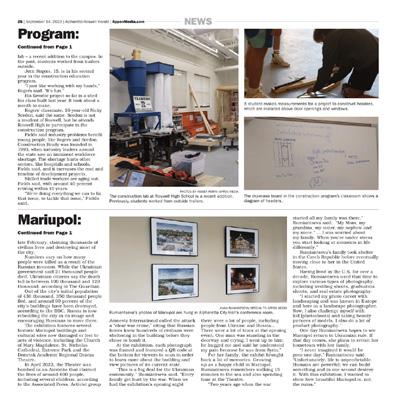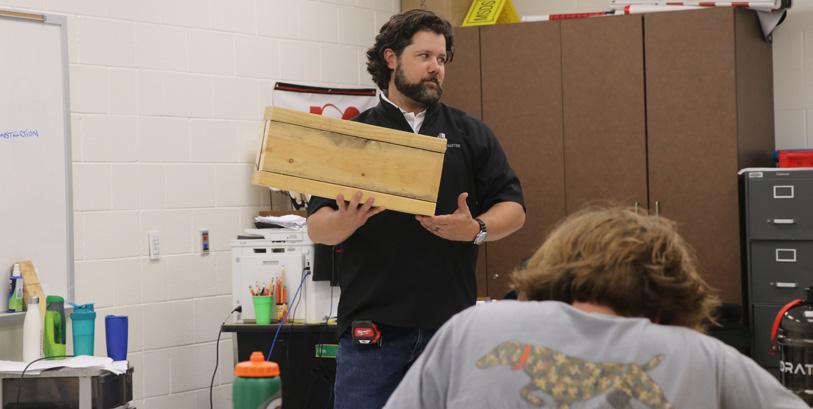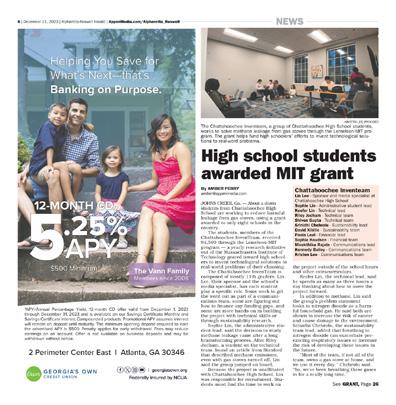Awards, Awards...
25 additional awards for editorial and advertising



25 additional awards for editorial and advertising



1st Place
Special Issues/Special Sections – Staff
Investigative Reporting – Staff
Feature Photograph – Amber Perry
Serious Column – Carl Appen
Education Writing – Shelby Israel
Business Writing – Amber Perry
Page 1 – Staff
Breaking News Writing – Hayden Sumlin
Serious Column – Pat Fox
Local News Coverage – Staff
Lifestyle Coverage – Staff
Layout & Design – Staff
Page 1 – Staff
Education Writing – Amber Perry
Lifestyle Coverage – Staff
Layout & Design – Staff
1st Place
Real Estate Ad – David Brown
Food Ad – David Brown
Home Furnishings Ad – David Brown
Newspaper Promotion – David Brown
2nd Place
Newspaper Promotion – David Brown
Food Ad – David Brown
Service/Institutional – David Brown
3rd Place
Food Ad – David Brown
Service/Institutional Ad – David Brown
Home Furnishings Ad – David Brown


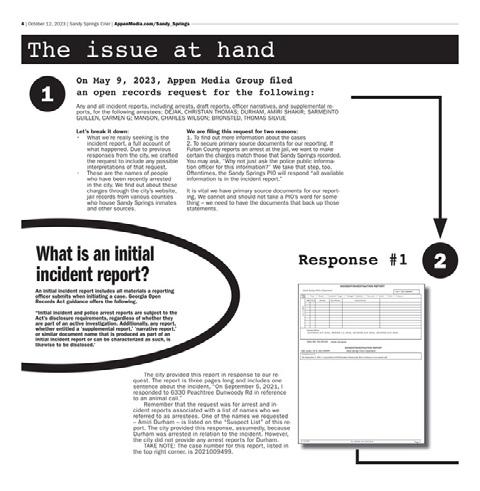






By AMBER PERRY amber@appenmedia.com
MILTON, Ga. — As members of Milton’s election advisory committee, two private residents recommended to the City Council last December that the city should run its own election. Their presentation, and the report provided afterward, did not paint the full picture.
Mark Amick, one of a number of people subpoenaed in the 2020 Fulton County election probe, and Lisa Cauley, president of the Fulton County Republican Women group, each made their way to the podium Dec. 5 with a presentation that excluded portions of a comprehensive draft report. The original report was created by Deputy City Manager Stacey Inglis prior to the meeting.

Inglis, one of two city staff members on the Milton Municipal Election Feasibility Committee, wrote a lengthier, more detailed conclusion of the group’s findings. It consistently referenced state code, and it explained matters that had been reconciled by the city attorney.
Also noteworthy, Inglis dedicated several pages to the risks associated with the city undertaking its own municipal election, such as its lack of experience, public scrutiny, potential staffing issues, voter disenfranchisement and errors associated with hand-counting paper ballots.
Inglis also estimated a higher price for first-year and future costs associated with city-run local elections. In her report, the first-year cost was estimated at $80,196. The report formally presented to the council by Cauley listed a cost of $72,253.
With one-time costs out of the way, Inglis estimated future municipal elections would cost the city $64,064. Cauley’s presentation set a future cost of $56,588.
In a recent interview, City Manager Steve Krokoff said Inglis’ report is characteristic of all city staff presentations.
“We’re used to presenting information to the [City] Council, and we give them all the information for them to make an informed decision,” Krokoff said. “Stacy’s report was done as part of the committee, but also at my direction. I was the one who said from the very beginning: ‘We need to ensure that we have a riskreward in there.’”
Missing portions
Major parts of Inglis’ report did not
As Milton pursues running its own municipal election, other North Fulton cities are paying attention. Some have allocated money in their 2024 budgets to follow suit. The City of Atlanta is watching too. In April, Milton City Manager Steve Krokoff wrote to the council that an Atlanta official informed him that they would be watching how Milton handles its municipal election. “As pioneers in this process, we know that all eyes are on us, and failure is not an option,” Krokoff wrote.
SCREENSHOT
The final report did not include risks associated with the city running its own election, considerations that staff had put in earlier drafts of the document. The city has faced major public scrutiny since it decided to run its own election this November. Issues have been raised about rising cost and the influence of partisanship, which has been alleged to have influenced the number of polling locations. The council would later increase the number of polling places to three, one in each City Council District. Risk considerations continued on the following two pages.
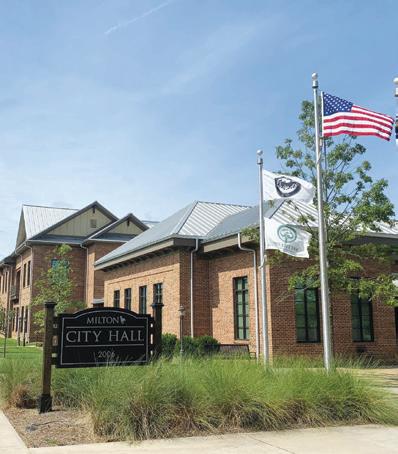
make it to Council Chambers for public consumption. It had been reworked for an alternative report, sent to city staff Dec. 15 by Councilman Paul Moore four days before the council’s official vote to run its own municipal election.
In that email, Moore wrote: “I hope you will agree that we are delivering a very succinct version of the larger document (Inglis’ draft) and a very direct reflection of what was already presented and was compelling in the December 5th meeting.”
Moore’s email was directed to Krokoff, Inglis and City Clerk Tammy Lowit, who was the second city staff member on the election committee.
Moore could not be reached for comment.
While two councilmembers served on the election committee, Moore and Rick Mohrig, the other four councilmembers and the mayor were not aware of the original draft report from Inglis.
Appen Media has covered the movement in North Fulton toward city-run municipal elections since breaking the story in August 2021.
Send thoughts, tips and story ideas to newsroom@appenmedia.com.
According to emails obtained in an open records request, Mayor Peyton Jamison asked the city manager just this past August about Inglis’ report and why it had not been presented to the council or to the public.
In response, Krokoff said some committee members entered the process with “preconceived notions.”
“This endeavor seemed more like a justification exercise than a true feasibility assessment, which introduced challenges for staff members who tried to present factual information but were consistently rebuffed,” Krokoff said. “Their experience on the committee was distressing and demoralizing.”
‘Undermining the process’
He also said some committee members indicated city staff were “undermining” the process.
“Their dissatisfaction with the staffcompleted draft report suggested to me their reluctance to provide an unbiased assessment to the City Council,” Krokoff wrote the mayor. “It also became apparent that I lacked the necessary support to counter this narrative, given the presence of two city councilmembers and two highly influential community members.”
Appen Media has annotated the draft and final versions of Milton’s feasability report. See the differences at appenmedia.com/electionsreport.
In a recent interview with Appen Media, Krokoff elaborated on the entire election committee experience. He said he explained the committee’s makeup of two councilmembers, two city staff members and two members from the general public to the City Council in a September 2021 email. But, in hindsight, Krokoff said the group should have followed the format of most other city committees — seven appointees, each selected by councilmembers, for more diversity.
“I regret that composition of the committee,” Krokoff said.
By AMBER PERRY and CARL APPEN amber@appenmedia.com
and
carl@appenmedia.
com
Milton residents in an area that has historically voted Democrat will have to travel farther to cast ballots in the upcoming nonpartisan election.
The decision affects precincts ML05, ML06A and ML06B in the city’s southeast corner.
Voters in ML06A and ML06B, which run from Francis Road to Windward Parkway, consistently support top Democratic tickets. Sen. Rafael Warnock and gubernatorial candidate Stacey Abrams, both Democrats, won there in 2022. So did Joe Biden in 2020 and Hillary Clinton in 2016.
ML05, the precinct from Cogburn and Hopewell roads east, recently swung blue. In
2022 voters there supported Gov. Kemp, but they also backed Sen. Warnock over Republican Herschel Walker in the general election and runoff.
The rest of Milton, almost always votes red.
With the exception of 2020, when the city’s northernmost precinct went for President Biden, the southeast corner is the only area with majority blue turnout.
In previous years, voters had four polling sites in the city’s southeast corner: Cambridge High School, Hopewell Middle School, Cogburn Woods and Manning Oaks elementary schools.
Additionally, during the early voting period, they could participate at any Fulton County location, including the Alpharetta Branch Library. With the city running its own municipal elections this year, that option will
go away.
The city’s plan is to have two polling places open on Election Day, one at City Hall and the other at Milton City Park and Preserve. Advanced voting will be limited to City Hall.
Some City Council members who voted in favor of two locations cited low voter turnout on Election Day in the city’s southeast corner.
It is correct that Election Day turnout is drastically less in those precincts by percentage. However, the difference in actual vote count is not so distinct. The area is one of Milton’s most densely populated. The three precincts make up 35.3% of Milton’s voting population. In the most recent election, 31.3% of the city’s votes came from there. More ballots were cast from ML05 voters than any other precinct.
The story is similar with Election Day turnout. The southeast corner has a lower
By DELANEY TARR and CARL APPEN delaney@appenmedia.com carl@appenmedia.com
ROSWELL, Ga. — The City of Roswell is considering changes to its open record policies that would require people to either provide “verifiable” names and addresses or go to Roswell City Hall in person to retrieve requested records.
Some city officials say the move is an effort to address a large volume of requests, claiming Roswell receives considerably more inquiries than other North Fulton municipalities.
Appen Media decided to find out if that’s true. It’s not.
In fact, Roswell has received fewer record requests than almost all of its sister cities this year, according to documents reviewed by the news organization.
Roswell has received 406 requests since Jan. 1, according to the City Clerk’s office. The city has approximately 92,530 residents.
Sandy Springs, its neighbor to the south, received 947 requests over the same time period. Sandy Springs has approximately 14,000 more residents than Roswell.
Milton, a city less than half the size of Roswell with 41,259 residents, received 507 requests.
Only Johns Creek, a city slightly smaller than Roswell, received fewer requests. Officials there provided documents showing it had received 323 inquiries during that time.
Alpharetta, a municipality consistently com-
pared with Roswell despite its smaller population, takes the cake. That city received 1,336 requests, more than three times as many, during the same time window.
It’s worth noting that Roswell was one of only two cities that charged Appen Media for documents related to this analysis, despite the query being the same across jurisdictions.
Residents, including one sitting City Council member, have raised concerns about the legality of the proposed policy changes.
At a March 14 Administration, Finance, Recreation and Parks Committee meeting, Roswell Councilwoman Sarah Beeson cited state law that dictates any person, corporation or entity may request access to public records.
“I cannot be emphatic enough about how much I oppose this resolution,” Beeson said.
Roswell Mayor Kurt Wilson assured residents that longtime City Attorney David Davidson has approved the measure after speaking with the state Attorney General’s Office. The resolution, Davidson said, is “simply following state law.”
Appen Media requested documents to vet that statement through an open records request, but the city has not yet provided them.
Among the six members of the City Council and mayor, Beeson was the only elected official to speak against the policy change.
The measure is scheduled for an official vote before the City Council at its next regularly scheduled meeting March. 27.

turnout percentage, but with a higher population that can mean more votes cast.
In the 2021 uncontested mayoral race, ML05 voters cast more ballots on Election Day than those in ML01A, which houses Milton City Hall.
Milton Mayor Peyton Jamison has advocated for three polling locations, the third at the Milton Public Safety Complex. But his motion failed to garner a majority.
In light of the council action, a Milton resident living in Kennewick Place, on the outskirts of District 3 in precinct ML06B, must travel more than 6 miles to vote at City Hall and nearly the same distance to vote at the Milton City Park and Preserve. Had the mayor’s recommendation been approved, that same resident would have driven less than 2 miles to cast a ballot at the Public Safety Complex.






Feature Photograph - First Place, Amber Perry





Newspaper Promotion Ad - First Place, David Brown

Board expected to vote on plan to redistrict elementary schools
By SHELBY ISRAEL shelby@appenmedia.com
FORSYTH COUNTY, Ga. — Forsyth County residents issued a plea to the School Board Sept. 20 to maintain school attendance zones ahead of an October vote to redistrict more than half a dozen elementary schools next year.
More than a dozen residents addressed the Board of Education at the 6 p.m. called meeting. Originally scheduled at Forsyth Central, school district staff relocated the meeting to West Forsyth High School to be closer to the families that will be affected.
First presented Aug. 8 at a Board of Education work session, the draft plans will impact students at Big Creek, Haw Creek, Mashburn, Sawnee, Brandywine, Kelly Mill, Vickery Creek and the current Midway elementary schools. It will not affect middle and high schools.
Schools staff said the redistricting is aimed at easing overcrowding at the elementary schools, as well as populating the new Midway Elementary on Mullinax Road near Denmark High School, which is slated to open ahead of the 202425 school year when the redistricting would take effect.
School district officials said it is a priority to prevent future redistricting that would relocate the same group of students again. But, resident Rafael Pargas said this comes too late for his neighborhood.

Forsyth County resident Jessica Johnson speaks against the proposed elementary school redistricting Sept. 20 at a Board of Education public forum at West Forsyth High School. Johnson, PTO president at Kelly Mill Elementary School, said the redistricting will “create upheaval and fragmentation” of the school’s close community.
“With this given proposal our neighborhood Shepherds Pond has gone through, it will have gone through, four different elementary schools in 10 years’ time,” he said. “Midway, Shiloh Point, Brandywine and now the proposed Big Creek.”
Many speakers identified increased traffic on Post Road as a concern if the draft plans are approved. The Georgia Department of Transportation estimated annual average daily traffic on Post Road near Vickery Creek elementary and middle schools at 13,500 in 2022.
While residents of various subdivisions shared personal concerns, all speakers
identified removing students from established friends and community at their schools as a key issue behind the proposal.
One of the affected neighborhoods, Fieldstone, drew notable support against the redistricting plans at the meeting.
“This decision lacks a practical basis and will definitely create upheaval and fragmentation of a huge community that has already been ingrained and rich and established at Kelly Mill,” said Jessica Johnson, Kelly Mill Elementary School parent-teacher organization president and Fieldstone resident.
The proposed redistricting would move
Kelly Mill students to Vickery Creek Elementary School.
Johnson said the redistricting would dismantle the Kelly Mill PTO board, as four of its six members’ children would no longer be students at the school. She said the redistricting would negatively impact the school’s finances if it lost the support of the PTO board.
“Over 55 percent of the school donations and contributions currently come from the Fieldstone neighborhood,” Johnson said. “The impact on [Kelly Mill Elementary’s] financial resources would be immense, thus directly affecting the quality of education and opportunities available to our students.”
One speaker, Mary Ann Barr of the Summerdale neighborhood, said she would lose her child’s after-school program if redistricted from Sawnee to Kelly Mill Elementary School.
“The biggest impact on me personally and my family is we're losing our after-school care because our daycare does not pick up from Kelly Mill,” she said. “They only pick up from Sawnee. So, in our household, we have two working parents. That means that now I've got to figure out childcare, which is, just like the housing crisis, in high demand and hard to find.”
District 3 Board Member Tom Cleveland said the Board of Education will consider speakers’ feedback for possible revisions before the redistricting plan’s final approval.
The School Board will discuss public input and review staff recommendations on the redistricting at an Oct. 10 work session set for 4 p.m. Final approval of the redistricting map is slated for 6 p.m. Oct. 17 at the regular board meeting.
Further information, updates and maps can be found at forsyth.k12.ga.us/ redistricting.
Forsyth Board of Education to finalize attendance map
By SHELBY ISRAEL shelby@appenmedia.com
FORSYTH COUNTY, Ga. — Forsyth County Schools is proposing a minor update to its 2024-25 elementary school redistricting map ahead of final approval Oct. 17.
Schools Deputy Superintendent Mitch Young presented the new map at a Board of Education work session Oct. 10. The change allows fewer than 50 students who were redistricted to Kelly Mill to remain at Sawnee Elementary School.
The 2024-25 elementary redistricting will impact students at Big Creek, Haw Creek, Mashburn, Sawnee, Brandywine, Kelly Mill, Vickery Creek and the current Midway elementary schools. It will not affect middle and high schools.
Schools staff said the redistricting is aimed at easing overcrowding at the elementary schools, as well as populating the new Midway Elementary on Mullinax Road near Denmark High School, which is slated to open ahead of the upcoming school year when the redistricting will take effect.
The school district hosted a public forum Sept. 20 at West Forsyth High School to hear feedback from the community on the proposal.
More than a dozen residents said they wanted to remain in their current districts at the meeting. Many said the changes would uproot their children from established communities at their schools and increase congestion on Post Road.
“Nearly the same number of students that we’re putting onto Post Road, we’ll be pulling off of Post Road to take down Campground Road as a way to get to the new Midway,” Young said at the Oct. 10 work session. “It’s
almost, nearly a one-for-one swap out.”
Young said Schools Transportation Department studies indicate the new Midway Elementary School location should also relieve congestion at Post Road and Ga. 9.
The updated map primarily affects students who live in the ¬Summerdale ¬¬subdivision. Residents of the subdivision spoke at the September forum.
The School Board will formally approve the redistricting map at 6 p.m. Oct. 17 at its regular meeting at 1120 Dahlonega Highway.
Also at the work session, Forsyth County Schools lowered the weight of its end-ofcourse assessments from 20 percent to 10 percent of students’ final grades.
As a regulation, the Board of Education did not vote on the item. A regulation is an administrative decision made by staff to reflect district policies that are adopted by the School Board.
Schools Associate Superintendent of
Teaching and Learning Lee Anne Rice said the Georgia Board of Education now allows school districts to lower their end-of-course assessment weights to no less than 10 percent. She said Gwinnett and Oconee counties are also lowering their end-of-course weights to 10 percent, but Cherokee and Dawson counties are maintaining theirs at 20 percent.
Rice emphasized the change will allow students to be assessed by their performance throughout the entire course, rather than a single test on a single day.
However, School Board members Mike Valdes and Wes McCall expressed concerns the new weight may lower the district’s standards. Valdes said it could also leave students unprepared for what they face in college.
“What does it really do to say, ‘Okay, we’re going to help your anxiety by shielding you from a reality that you’re going to face much more intensely once you step into college’?” Valdes said.
By SHELBY ISRAEL shelby@appenmedia.com
FORSYTH COUNTY, Ga. — Forsyth County Schools is gearing up for redistricting ahead of the 2024-25 academic year to alleviate overcrowding at its elementary schools.
Schools Deputy Superintendent Mitch Young presented plans for the process Aug. 8 at a Board of Education work session. While no formal vote was taken, Young said the presentation provides insight for the board to finalize the plans this fall.
Drafts of the redistricting map will be presented at 4 p.m. Sept. 12 at the Board of Education work session.
“What we looked at even a couple of months ago and what we’re seeing right now may not be 100 percent in line with where it was a few months ago,” Young said. “As close as we get to this timeline, we want to have the most accurate, realto-time numbers we can before we make any recommendations to [the School Board].”
At the end of the 2022-23 year, Forsyth County Schools had a total enrollment of 54,393 students. Schools Chief Communications Officer Jennifer Caracciolo said Aug. 7, less than a week into the semester, the school system enrolled 54,338 students, with increases likely through Labor Day.
School enrollment has consistently grown over the past decade in Forsyth County. Since 2012, overall enrollment grew nearly 43 percent. U.S. Census Bureau data shows about 25 percent of the county’s population is under 18 years old.
In addition to spreading out students at the existing schools, Young said the redistricting will populate the new Midway Elementary School on Mullinax Road near Denmark High School.
The school system celebrated a “beam signing” for the new school July 18. The original facility, which was built in 1961, was earmarked for a new and larger location by the Forsyth County Commission in 2022.
Schools Superintendent Jeff Bearden said at a July meeting the new Midway school is on track to open next fall.
Young said the redistricting is likely

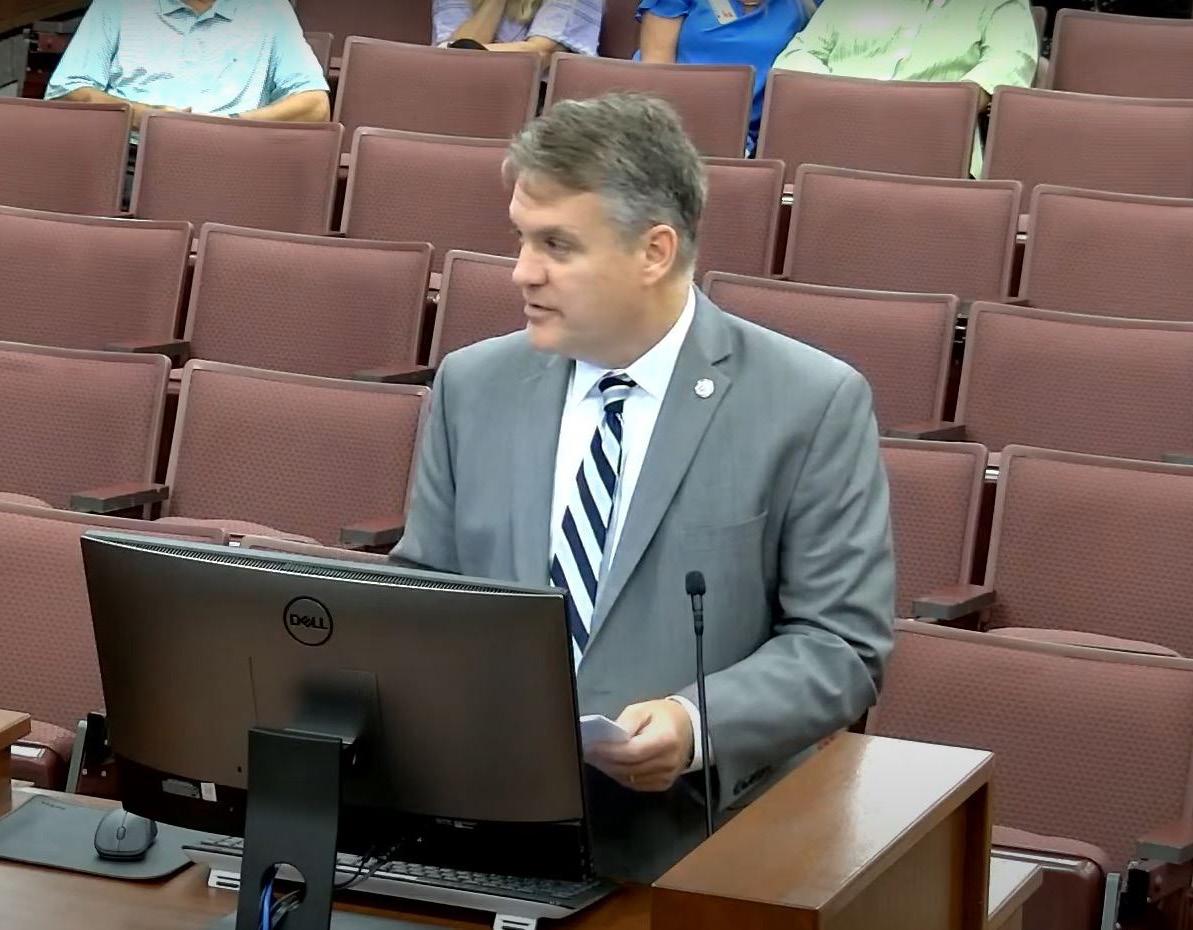
to impact students at Big Creek, Haw Creek, Mashburn, Sawnee, Brandywine, Kelly Mill, Vickery Creek and the current Midway elementary schools.
He said the school system is proposing students who are enrolled in dual language immersion programs and their siblings at Brandywine, Kelly Mill and Mashburn be allowed to remain at their current schools if they are enrolled in the programs.
“Hopefully, if things will work out, then we would also be able to provide transportation to those students for [dual language

immersion],” he said.
Students entering fifth grade and their siblings who are affected by the redistricting may remain at their current schools for one year but must have their own transportation. Parents or guardians of these students must submit an out-of-district application.
The redistricting for the 2024-25 year will not affect middle and high schools.
A draft map for the elementary schools is scheduled to be presented Sept. 12 at the Board of Education work session,
with Sept. 13-29 reserved for online public feedback.
The School Board will formally vote on the redistricting Oct. 17 at its regular meeting. Out-of-district applications will open Oct. 1-Nov. 30.
To involve residents throughout the process, the school district is hosting a public forum on the draft redistricting map at 6 p.m. Sept. 20 at the Forsyth Central High School auditorium.
Updates will be posted at forsyth.k12. ga.us/redistricting.




Here’s a bit of news trivia for you:
The locations at the start of articles (you know, the ones that look like this: SANDY SPRINGS, Ga. — ) are called datelines. They’re used to show readers where the story is taking place. Some newsrooms use them to indicate a reporter had boots on the ground.
The last few weeks Appen Media has had some special datelines. We’ve published stories that start with GREENVILLE, S.C.; CHATTAHOOCHEE HILLS, Ga.; ATLANTA, and now OPELIKA, Al.
Using them means Appen Media had boots on the ground in all those places.
Most of our city governments go on “strategic retreats” every year. The whole city council and administrative staff will pack up and head out of town for a few days. They offer a range of reasons – to visit a downtown they want to model, team building or really buckling down to focus on the issues.
The meetings aren’t recorded or streamed online, and most city “notes” are scant. Last year Roswell went to Greenville for five days and came home with a plan to revise the city’s charter.
The meeting minutes – the official record of what took place that week – was 34 words long. If you’ve ever been to a Roswell City
Council meeting, you know they speak more than one word every four hours.
Of course, by law these meetings are open to the public. Any time a quorum – or voting majority – of elected officials gather for city business, discussion, research or action, you’re allowed to be there.
But if the meeting is in Greenville, who is going to drive three hours just to go along and be in the room?
Well, us, I suppose.
When the Johns Creek City Council traveled to Greenville, S.C. for the weekend, Amber Perry went along too. Shelby Israel woke up at dawn on a Sunday to be in Chattahoochee Hills for the Alpharetta retreat. Then she did it again the following day.
Alex Popp had it easy. Sandy Springs held their retreat in Sandy Springs.
Delaney Tarr is spending the weekend in Opelika, Alabama, to cover the Roswell City Council retreat.
She really got the short end of the stick.
The City Council is staying at the Auburn Marriott Opelika Resort & Spa at Grand National. I tried to get her a room there too, but the entire place was booked. So, each day Delaney is making a quick drive over from Opelika’s Hampton Inn. Imagine that.
On behalf of city officials and staff, taxpayers are footing the bill for these excursions.
For the reporters in the room – and I assure you, we’re the only ones – that bill
falls squarely on our shoulders. Your local newsroom. (So maybe after all, it’s a good thing every room was taken at the Grand National.)
We’re glad to do it.
In fact, Managing Editor Pat Fox and I think it’s pretty special that you can open up the local newspaper and see a dateline from South Carolina because there’s a newsroom willing to follow local officials there.
We have problems getting metropolitan dailies to show up at city council meetings to cover the city council.
Local news is not always local. Just because Roswell is strategizing in Opelika doesn’t mean what they do there happens in a vacuum.
Chattahoochee Hills is not Las Vegas. What happens there comes home.
Shelby was in the room when Alpharetta approved requests for funding increases.
Amber got to walk along the Reedy River with the Johns Creek City Council as they took notes on Greenville’s public art, civic partnerships and cohesive branding. Now those are all lessons the city will hope to implement as the Johns Creek Town Center moves forward.
I can tell you this much, Delaney’s report from Opelika is going to be a lot more comprehensive than the one that comes from the city.
So, we think it’s important to go. Even if we have to pay our own way.

The City of Sandy Springs doesn’t have a mayor. Or perhaps it has two. You wouldn’t be able to tell if you looked through the city’s financial records. In response to an Open Records request for payroll data from an eight-week period, the city redacted the name of every employee that collected a check. The list is over 3,300 lines long and has a total paid amount of $10.4 million.
According to the city’s website, Sandy Springs employs around 370 people. It’s difficult to reconcile that number with the financial data provided to Appen Media.
Do each of the city’s employees earn $14,054 a month? Exactly how many people are on the payroll? It’s unclear.
One possible explanation is that the list spans multiple pay periods. So, if an employee is paid bi-monthly, their name may show up more than once. It would explain why the city made two separate payments with the job title
“MAYOR.”
On the other hand, that math doesn’t quite add up either.
In a document obtained this summer by Appen Media, the city lists 332 people as receiving paychecks in the Public Safety Department.
There are six City Council members and a mayor. At least we think there is only one. Then a city manager and, for now, one assistant city manager. Plus a city clerk and her assistant.
So that’s 343.
Is it possible that 27 people operate the rest of the City of Sandy Springs? It is, after all, the beacon of a city that “takes the people private,” outsourcing all operations to downsize big government. Oh, actually, they walked that landmark privatization back in 2019.
Zoning, code enforcement and permitting all have managers. Economic Development is its own department, as is Finance. All the city’s parks and facilities must be maintained. Public Works is a behemoth of a job. And of course, there’s the Communications Department, which we’re pretty sure exists.

CARL APPEN Director of Content and Development
I believe in giving credit where its due.
A new reporter joined Appen last week. As part of his training I walked Hayden Sumlin through our local police dashboards.
“This is where you go to find out what is going on.” I pointed out how all cities use the same software, but only Roswell makes the report available on demand.
Every other city makes you jump through hoops to find out what happened next door. Some cities, like Sandy Springs, will even try to hide it all together.
Roswell makes it all available to the public, 24/7, without having to file any requests. You just type in the address and it will tell you what happened. I reiterate –this is the same software used by Sandy Springs, Johns Creek and Alpharetta. Roswell, and likely Chief Conroy, are just the only ones who turned on the “make it easy for the public” button. They are aware that when it comes to physical safety, most folks don’t want to wait a week (or longer) for an answer.
There are times when a situation is particularly sensitive, though, and you have to ask the agency for more information. Enter Tim Lupo.
When I introduced Hayden to Officer Tim Lupo, I said he was a fantastic Police Information Officer and Hayden could go to him for anything related to public safety. I stand by it so much I think it’s worth publishing in this column.
Today Appen and Roswell Police have the relationship all cities should have with their local newsrooms.
Officer Lupo and his team are always fast to respond with information we need to go cover a story.
They also bring our reporters in, enabling us to tell the real stories behind the badge.
Does that sound like 27 people to you? Here, in the City of Sandy Springs?
I don’t think so either. So now we’re back where we started.
I’ll leave you with two things worth noting. We filed identical open records requests to all our Metro Atlanta cities. Sandy Springs is the only one that redacted names of every employee.
That request from the summer I mentioned, in which the city provided public safety payroll information, carries a clue.
In the summer document the city redacted the names of all police officers, including the chief, but it listed the names of firefighters. In this more recent request seeking employment pay stubs for the whole city, those firefighters’ names are now hidden.
As our public records lawsuit against Sandy Springs moves forward, the city’s transparency grows cloudier. Or, maybe it’s becoming more clear.
Why the change? I’m not sure. I asked the clerk’s office and communications team to no avail.
Maybe chalk it up to the fact that the city has two mayors. Or none at all.
In 2021 when a longtime murderer was brought to justice, Reporter Chamian Cruz dove deeper, interviewing the detectives who made it happen. She told the full story, one I argue is important for the public to know. Not just the arrest and mugshot, but the faces of the police personnel who had pursued the case for decades.
The relationship goes both ways. Last year when Roswell police were looking for a fugitive, they asked us to spread the word with our media partners up the East Coast. You better believe I sent it along to my whole contact list.
Last year, reporter Delaney Tarr noticed a string of suspicious arrests going on at area spas and asked Roswell police officials about it. We’re working on a big investigation, they said. Why don’t you come in, hear all about it and then we’ll keep you updated with our progress. It’s something most agencies say, but Roswell actually meant it. Fast forward to last week and Hayden brought it home, reporting a massive labor and sex trafficking bust spearheaded by Roswell police.
I don’t know Chief Conroy well. But I work with his staff and I see how the department operates.
So last week when Fulton County District Attorney Fani Willis said that Chief Conroy was one of the best police leaders in the state, I thought to myself, you know what, she might be right.
I am not writing this column because the Roswell Police Department just took down, in the chief’s words, “an extensive human trafficking and prostitution network,” executing 10 raids with 70 law enforcement personnel to cap a year-long investigation. But I want to give credit where credit is due.
Page One - Second Place, staff




Newspaper Promotion Ad - Second Place, David Brown


By AMBER PERRY amber@appenmedia.com
JOHNS CREEK, Ga. — It’s not often that you hear of a family owned and operated golf club, or one that takes so many environmentally green measures, but that’s Rivermont in Johns Creek.
Chris Cupit, owner and general manager of Rivermont Golf Club, is the son of one of the guys who started the place in 1973. In July the club hosted the Georgia Amateur Championship for the first time as part of a week-long celebration to mark its 50th year. There were also parties for the club’s 700 members and a night of fireworks.
Cupit and his mother Lynda are neighbors and live on the golf course. Cara, Cupit’s sister, will soon run a Pilates studio that was recently built next to the clubhouse. A brown spritely dog named Hobbes, after “Calvin and Hobbes,” acted as an escort to the new building.
Cupit said family-owned private golf clubs are an unusual model. There are member-run clubs, he said, but there’s an increasing number of companies who consolidate.
“We have to be successful, and we have to make money because it’s our livelihood,” Cupit said. “But our focus is on so much
more. My mom will say it’s her ministry.”
Family history
Cupit sat in his office on the second floor of the clubhouse, stately and tastefully dated, describing the story of his father David, how he came over from a big golfing family in Texas. David, who died in 2003, was one of 10 kids, and one of five who became a golf professional.
Cupit’s father moved to Atlanta and began working at the Atlanta Country Club in the ’60s, then Ansley Golf Club. Before making Rivermont what it is today, David was the first head golf professional at Dunwoody Country Club.
The Cupits became the sole owners in 1988 and since then, have fostered a sense of community among its members and beyond, like with the Rivermont Women’s Association.
While the club never had any exclusionary policies like other clubs at the time, Cupit said his family recognized the ladies wanted to be more involved and allowed not only members, but also women in the surrounding neighborhood to join.
The association has an investment club, a book club, a lunch bunch and several bridge groups. That day, about a dozen women played the card game in the dining
area. The association also regularly brings in guest speakers.
Eye on environment
Rivermont Golf Club has become known for its innovative green practices.
To fertilize the course, the club’s “mad scientist” Mark Hoban brews compost tea using worm manure, or worm castings, fish hydrolysate and mycorrhizal fungi, brought in from different areas around the country like Alaska.
Hatcher Hurd, former editor and writer for Appen Media, detailed Hoban’s positive impact on Rivermont in a story from 2015. Hurd reported Hoban’s “organic maintenance philosophy” earned him the Environmental Leader in Golf award from the Georgia Golf Environmental Foundation.
Cupit said Rivermont uses less than a pound of nitrogen per acre in a year, whereas golf courses tend to use four to five pounds of nitrogen per acre annually. Homeowners typically use one to two pounds of nitrogen per acre, he said.
He also said Rivermont’s irrigation uses recycled water.
“We’re the last bit before it goes in the Chattahoochee,” Cupit said. “So instead of all the runoff going from the neighborhoods
By AMBER PERRY amber@appenmedia.com
JOHNS CREEK, Ga. — Johns Creek officials raised questions about the estimated $4.2 billion economic impact mega-development Medley will have on the city in a larger discussion on tax abatements at its May 23 work session.
Medley, the 43-acre mixed-use project set to anchor Johns Creek’s Town Center, is projected to include 200,000 square feet of retail, restaurants and entertainment, 900 residential units and 110,000 square feet of office space.
Local media have reported 11 new tenants have signed leases at Medley, most of them food and beverage concepts. Phase I of the project is scheduled to open in the latter half of 2025.
The project was unanimously approved for tax cuts at a meeting of the Development Authority of Fulton County April 25. Medley will be taxed at 50 percent in the first year during the incentive period, bringing in an estimated $2.5 million, and will become fully taxable over a 10-year term.
Because inducement is the first step in a two-step process, Medley’s financing for $400 million in bonds was approved the same day as the city’s work session — prompting questions from councilmembers about the nature of tax incentives.
At issue is a loss in tax revenue for the City of Johns Creek. Kimberly Greer, Johns Creek assistant city manager, said the city will forgo $300,000 in tax revenue in year one.
But she said the city would also be getting the same amount in taxes, an increase over the current annual tax revenue received of roughly $80,000.
Mark Toro, Medley’s developer, won similar tax concessions 10 years ago with Alpharetta’s Avalon. For that project, Toro was awarded $550 million in tax abatements over 10 years as its construction was underway in 2013. That action cost Alpharetta an estimated $1 million in tax revenues over the 10-year term, according to officials with that city.
City asks for notification
Fulton County Economic Development Director Samir Abdullahi led the Johns Creek council’s work session discussion. Fulton County Commissioner Bridget Thorne also listened in.
Councilwoman Stacy Skinner questioned whether the Development Authority notifies the city in advance of tax abatement approval. While it wouldn’t be “first right of refusal,” Abdullahi said there could be a “courtesy notification.”
“There is no vote or voice that is in need from the city or the school in order to support the taxpayer,” he said.
Tax abatements apply to all tax structures,
going right into the river, we capture it.”
There’s 100 people waiting to become a member at Rivermont, Cupit said, in part due to the growth in golf’s popularity during the COVID-19 pandemic. Golf was one of the few things people could safely do.
The pandemic reminded everyone of how they’re social creatures, he said, contributing to the mission of Rivermont.
“If we can help people find friends and develop relationships, and have fun being together, centered around golf … that’s what we want.”
While he didn’t follow his father’s footsteps as a pro, Cupit played golf in college and involves himself with the game today whether it’s through volunteering with the Georgia State Golf Association or with the United States Golf Association as a rules official.
Cupid said he loves golf because it has some “old fashioned values,” defined by walking with a bag and not being bombarded by screens, and he enjoys that the game is “primal.”
“You get to hit a ball with a bat,” he said. “It’s fun to whack something.
Abdullahi said, including the city, the county and the school system.
Councilman Larry DiBiase cited a comment made in front of the Development Authority Board, stating that Medley was “dependent upon” the tax abatement.
“That's a pretty serious statement,” DiBiase said. “To me, as a council person, I'd like to know that that's going on, that the project is teeter-tottering on whether … it's going to go forward or not based on what the Development Authority, and the citizens of the Development Authority, [decide].”
He asked what the “guardrails,” the “transparency” and the “standard operating procedures” were to educate and inform local governments.
“This all worked out wonderfully. It could have not, also,” DiBiase said. “It could have gone the other way, and we would all have been flat-footed. The city would have been flat-footed.”
Abdullahi said there are no standard operating procedures, but the city has similar powers to the county in providing economic incentives.
In an interview, Mayor John Bradberry said Medley is integral to the city’s Town Center and that it’s already having a “ripple effect.”
“We will see over time that the benefits will far exceed anything that we may have given up
in the short term,” Bradberry said.
Hortons loses zoning case
At its regular meeting following the work session, the City Council voted 4-3 to deny a zoning application for contract owner Abid Khutliwala, who planned to build a Tim Hortons restaurant on a .84-acre parcel a few feet away from the Abberley Township gate off State Bridge Road. Councilmembers Dilip Tunki, Bob Erramilli and Erin Elwood cast the dissenting votes.
The property holds a joint-access easement, connecting Abberley’s private drive through a strip mall to the Goodwill parking lot, that would have been used in the business’ drive-thru. A major concern brought forth in previous public input meetings and at the City Council meeting was traffic congestion.
Khutliwala had revised the site plan in hopes of mitigating resident concern.
“Abid, don’t give up,” Mayor Bradberry said. “I know that that’s tough. We do want to see you succeed in Johns Creek.”
The city also recognized Kirk Franz for his 16 years of work as recreation manager. Franz, who recently accepted a position as Forsyth County Parks and Recreation director, received a standing ovation.
“Mr. Franz’s positive contributions to the city will continue to resonate for years to come,” said Greer, Johns Creek assistant city manager.
By AMBER PERRY amber@appenmedia.com
ROSWELL, Ga. — For now, the website for the Roswell Cultural Arts Center says it is “proud to have the Georgia Ensemble Theatre as its resident artist company,” but that relationship is changing.
After more than 30 years of residency in Roswell, the professional mainstage plays at Georgia Ensemble Theatre (GET) will have a new home at the Jennie T. Anderson Theatre in Marietta.
Its contract was canceled at a Roswell Recreation Commission meeting in early March with a recommendation that the theater enter the Roswell Cultural Art Center’s Partnership Production contract model.
Since its founding in 1992, the Georgia Ensemble Theatre has operated under a Resident Theatre contract which allowed the company to handle all things related to production.
But in Fiscal Year 2022, the theater presented only three of the five agreedupon productions. There were 47 “dark days” with no programmed activities. The city also cited a high turnover in production managers at GET, four managers in two years.
Production has a high price tag. GET co-founder Anita Allen-Farley said a play is about $60,000 to produce and musicals are well over $100,000.
“It’s expensive, and when you don’t have the money, you have to go … ‘how can we adjust to satisfy our patrons?’” Allen-Farley said. “By moving things around, by postponing different shows.”
Allen-Farley and Mary Saville, GET communications director, sat inside the theater’s studio on Hembree Parkway April 4, discussing the Georgia Theater Ensemble’s big move.
City partnership
The new partnership model would have allowed Roswell to help the Georgia Ensemble Theatre with production and marketing, run its box office and patron services, then collect the revenue. David Crowe, Roswell Cultural Arts coordinator, said the city would have found an “equitable split” once paying technical fees.
Many local arts organizations had been struggling with money post-COVID, Crowe said. The city has fostered successful partnerships using a similar


The Georgia Ensemble Theatre released a statement, saying staff will continue to be in conversation with Roswell officials about the future and are open to return if an opportunity arose. The theatre also said it would continue its investment into Roswell’s growth and well-being, considering its studio will remain on Hembree Parkway.
The studio hosts the theater’s administrative offices, its conservatory and the GET Travel Team, which takes professional productions to schools and senior communities at their locations. The studio also serves as the rehearsal space for mainstage plays.
model over the past couple of years, he said, like with the Atlanta Balalaika Society, the Atlanta Vocal Project, the Song of Atlanta chorus and the Atlanta Dance Theatre.
“We were trying to find ways to partner with [GET] so that they wouldn’t have to worry about rent anymore,” Crowe said.
The Georgia Ensemble Theatre had been behind on around $30,000 in rent for its space at the Cultural Arts Center. The City of Roswell offered reduced rent to the theater, but Allen-Farley said GET will pay half the cost at the Anderson.
Considering GET’s season isn’t quite over in Roswell, Crowe hasn’t actively sought other theater companies. But he intends to make those connections.
Crowe had been with the city’s Cultural Arts Center since 2015 but has known the founders of Georgia Ensemble Theatre much longer. He said Bob Farley, the late co-founder of the theater, gave him his “first big break” after graduate school to direct at GET. As a young person, Crowe also performed in “Of Mice and Men” in the 2004-2005 season.
“Georgia Ensemble Theatre has been an enormous asset to the city on and off for many years, and it’s unfortunate that we couldn’t find a way to continue working together,” Crowe said. “But the way that I see this is: everything is an opportunity. I think this is a great opportunity for them and for us to find something different, maybe.”
Despite city efforts to retain the theater company, Allen-Farley said she

couldn’t afford the partnership.
“The biggest issue was the model has [the city] selling all of the tickets, keeping all of the money until after the show is over,” Allen-Farley said. “And I have people that I have to pay, months before we open the show.”
The agreement would have also cut the theater’s 20-week season in half. Saville said producing two shows, rather than four or five, would generate far less income. The cut also would have meant the theater wouldn’t have been able to produce the same variety of shows, Saville said.
The Georgia Ensemble Theatre struggled during the COVID-19 pandemic, but Allen-Farley said it’s been fun to watch more and more patrons fill the seats. She said around 25 percent of the house was filled for the first two shows, which had gone up to 35 percent.
“And now, we’ve had some really nice houses with ‘Bright Star,’” Allen-Farley said. For the foreseeable future, “Bright Star” will be GET’s last mainstage production in Roswell.
Many patrons have told Allen-Farley they’ll ride along with her to Marietta and have bought subscriptions, or a package deal. While the move is only 13 miles away, she knows some won’t be able to follow her. The theater sees an older demographic, and many can’t drive at night.
“What I’ll miss most is that connection that we’ve had,” Allen-Farley said. “We’ve had some people that have had the same seats for 30 years.”
But she’s exploring a shuttle option for those who can’t make the drive themselves.

The Jennie T. Anderson Theatre has around the same number of seats as the Roswell Cultural Arts Center with 606 seats. It does not include a balcony, but handicap-accessible seating is on the front row.
Saville shared that the Anderson was once home to the Atlanta Lyric Theatre, which recently closed due to a collection of pandemic-related issues, like rising costs, reduced revenue and donations, and audiences’ reluctance to return quickly.
“Being able to regain our footing after our entire industry was closed for over a year has been a very slow process—much slower than anyone anticipated—and we all need patience, understanding and grace while we’re still in the ‘rebuilding’ phase,” Saville said.
While GET is raising prices of premium seating, it has made more “budget-friendly” seats available at the Anderson Theatre. Preview plays will be $15 a ticket, and regular performances will range from $25 to $70. Discounts will be offered to seniors, students, educators, military/veterans and first responders.
The Georgia Ensemble Theatre is set to produce three plays at the Anderson, in October, February and April, though the titles have yet to be announced. GET will also co-produce two musicals in the Overture Series with the Anderson Theatre, “The Light in the Piazza” in December and “Ragtime” in June of 2024.
“I think people will enjoy the experience of watching a play [at the Anderson Theatre]. It is a change. But that doesn’t mean that it’s a bad thing,” Saville said. “Change is just inevitable.”


Service/Institutional Ad - Second Place, David Brown


















Lifestyle Coverage - Second Place, staff

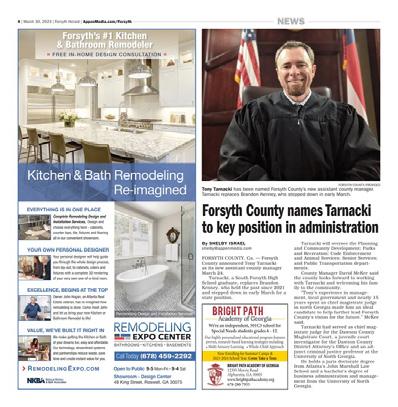











Alpharetta is considering placing what amounts to a threemonth gag order on ethics complaints lodged against candidates running for local office this year. That includes incumbents.
It’s a bad idea.
The City Council heard a report May 15 from City Attorney Molly Esswein that proposed amending the ethics ordinance to prohibit acceptance of ethics complaints against incumbents during the three months preceding a municipal election. This includes a primary or the general election.
When the matter came up earlier this week, the City Council tabled it. Councilmembers couldn’t agree on whether to include city residents on the Ethics Board or appoint attorneys from out of town.
Only Councilman John Hipes raised issue with that portion of the proposal that would extend candidates a blanket immunity during the height of a campaign.
Politics can be a nasty business, even at the local level. There were a lot of sleazy allegations thrown around in the 2021 Alpharetta City Council elections, none substantiated, so none worth printing then or now.
An ethics complaint, legitimate or not,
can bludgeon a campaign and tarnish the reputation of a decent public servant.
Let’s consider Milton.
Before the ink had dried on its new city charter in 2006, two council members faced ethics charges, which were dismissed by the city ethics board. The charges were then refiled before the state Ethics Commission.
The mayor also was targeted with a campaign-related state ethics complaint.
And it didn’t stop there. One member of the Milton Ethics Board filed an ethics complaint against another member of the Ethics Board.
Council meetings devolved into accusations pitting one, two or three councilmembers hurling charges against the others.
Even after hiring an organizational psychologist and holding two team-building sessions, the Milton City Council was still a mess, and there was no end in sight.
After five ethics complaints in its first three years, Mayor Joe Lockwood pronounced it madness, saying each case was politically motivated.
Finally, Milton City Attorney Ken Jarrard – donning his red bow tie for maximum effect – suggested the city ditch its resident-based ethics board and name three out-of-town attorneys to preside over ethics cases.
While the measure didn’t bury many hatchets in the city’s verdant pastures,
governing in Milton gained traction and began operating.
Around the same time Milton was finally getting its sea legs, the young city of Dunwoody struggled with ethics warfare of its own.
Five years after it incorporated in 2007, the entire City Council faced an ethics complaint from a resident before the ethics board even had a set of bylaws on how to operate.
That sparked another series of ethics complaints.
The city attorney was forced out for allegedly leaking closed-meeting information. He took a lie detector test to disprove the charge, but it didn’t matter. A councilwoman spent more than a year defending herself from the same charge. She countered with an ethics complaint against a member of the ethics board and the attorney for the city. And for good measure, she filed ethics complaints against the mayor, City Council and the city manager.
The complaints were withdrawn after the city rang up more than $100,000 in legal fees.
Chuck it up to growing pains, I guess, but local government can be a squalid arena.
Even with this sordid history, though, it makes little sense to do what Alpharetta is considering. As proposed, the measure would provide a three-month blanket immunity to an incumbent seeking re-election.
Most striking of all is that it would
deprive the electorate knowledge of possible malfeasance in a candidate they may support. It’s striking because Alpharetta City Attorney Molly Esswein is an associate at Jarrard & Davis law firm, which provides government counsel throughout north Metro Atlanta. Ken Jarrard is Forsyth County Attorney and Milton City Attorney. Angela Davis is Cherokee County Attorney.
Both speak throughout the state at law conferences on the Georgia Open Meetings Act and the Open Records Act.
I’ve had my tussles with Ken Jarrard over government disclosure of information. He’s a tough hombre. But one thing I am certain of is that he or his firm would never introduce a policy to shield government officials from legitimate criticism unless they were directed to do so by their client.
That narrows things down.
This fall, Alpharetta has a mayor and three City Council seats on the ballot.
My sense is that one or more of these incumbents fear a smear is near.
This could all be avoided if Alpharetta adopted the same tack as Milton took 10 years ago. Get outside lawyers to evaluate ethics complaints and be rid of this silliness.
As for the three-month grace period from ethics complaints, elected officials should be accountable through their entire terms. They deserve not one second of immunity from facing ethics charges.

PAT FOX Managing Editor
My first newspaper job was at the Marion County Record, a small weekly in central Kansas.
The late editor and publisher Bill Meyer taught me everything I know about community journalism. Bill’s wisdom and his command of writing for his smalltown audience was an acquired taste for a young college graduate with aspirations for the New York Times or Chicago Tribune. It took months, but I finally came around.
The first thing Bill told me was to focus primarily on the massive historic courthouse directly across the street where all county government business took place. An annex, just off to the side, was home to the City of Marion Police Department.
Bill told me that at one time, the courthouse had an old Civil War cannon on its front lawn. It was aimed straight at the newspaper. The antique had been removed by the time I arrived in 1980.
But last Friday, they lit the fuse anyway.
City police, acting on a warrant signed by a magistrate judge, raided the newspaper office, confis-cating equipment, computers and other materials necessary for publishing The Record. They didn’t stop there.
Police also raided the home of the publisher, Bill’s son Eric Meyer, seizing equipment and electron-ics.
The raid sought information on a confidential source the newspaper had used to investigate a DUI conviction of a local business owner applying for a liquor license. The news staff never intended to publish the story because they surmised it was planted to discredit the business owner. Neverthe-less, they did check out the lead by combing through government records.
During the process of the home and newsroom search, police snatched a reporter’s cell phone, aggravating an earlier injury she’d sustained to a finger.
Eric’s 98-year-old mother, Joan, who shared ownership of the paper, also lived at the house with Eric. Police took her computer, the router that gave her access to Alexa smart speakers she used to call for assistance and to stream television.
Joan watched as police pored over her son’s bank rec-ords and investment papers.
Joan was the paper’s community editor, and had been when I worked there, so I knew her well. She was always laughing, smiling about something.
Her son said she was in good health for her age up till last Friday. That night, she was crying. Follow-ing the police raid, she couldn’t eat or sleep.
The next day, she collapsed and died.
The Marion County Record was my pro-
fessional nursery. Now, it’s ability to publish has been seized. I know of no other instance in my lifetime in which police shut down a newspaper in the United States. There are countless cases of it happening in Turkey, China and Russia.
I spoke with Eric on Monday, and, like his father, he was focused on getting the paper out this week. He said he was in the middle of untangling the mess left in the wake of the police raid.
“Even if I have to scribble something out on a notebook and deliver it door to door, we’re going to have something published this week,” he said.
So, this is where I should write some lofty platitudes about freedom of the press, about guarding our constitutional rights – maybe quote Jefferson. I should write that the press is the only profession specifically cited for protections in the U.S. Constitution.
I should write all that.
But, I’m too angry. I’m furious.

Alpharetta is all ears, awaiting word from Brandon Beach to explain why he’s promoting a professional hockey franchise in neighboring Forsyth County instead of in his home city.
Alpharetta City councilmembers took turns Nov. 25 berating the executive director of True North 400, a self-taxing community improvement district that promotes and funds improvements in Alpharetta, Roswell and Milton. Beach is also a state senator, representing Alpharetta and other parts of North Fulton and Cherokee counties. Neither his Senate district, nor his community improvement district covers an inch of Forsyth County.
Beach is also on the board of the Fulton County Development Authority which promotes economic growth and business recruitment.
Councilmembers blasted Beach because he participated in a discussion about reports that a National Hockey League franchise is destined for The Gathering, a development proposed in Forsyth County. Alpharetta officials say they’d like the hockey team headquartered in the city’s North Point corridor, an area that has lost much of its retail luster over the past 10 years. The area has suffered since the opening of megaentertainment developments in other parts of the city, like Avalon and City Center.
Beach says the Alpharetta City Council’s
scorn is a lot of bunk.
“I was on a radio show…I was bragging about Avalon and the interchanges and all the stuff we’ve done and why we changed our name to True North 400 so we could be more involved in economic development, because since COVID a lot of office space is vacant,” Beach said.
At the end of the interview, Beach said, he was asked about the hockey arena.
He said he responded by acknowledging that it had been in the paper that plans were presented to the Forsyth County Commission in April that might bring a professional hockey franchise to The Gathering in South Forsyth. If approved by the Forsyth County Commission, The Gathering would be a massive, $2 billion entertainment complex along Ga. 400, just 3 miles up the road from Alpharetta. It would include a 750,000-square-foot sports arena.
“In no way, shape or form am I promoting it or was I promoting it,” Beach said. “I was giving facts.”
The senator said the Alpharetta mayor and council overreacted to his comments.
“Would I love to see it in North Point Mall? Yes, and that would be an ideal location,” Beach said. “But, I will tell you, if it’s not going to go to North Point Mall, I’d much rather it go an exit up than go to Gwinnett or Cobb (counties).”
Alpharetta can blame itself
Amid the vitriol leveled against Beach at the Nov. 25 Alpharetta meeting, City Councilman Jason Binder tempered his

comments saying pretty much what Beach says: if Alpharetta can’t have the hockey franchise, it may glean some residual economic scraps from having it nearby.
Facts may help resolve this.
While the city made no formal announcement, Alpharetta knew about a possible hockey franchise way back in January. It commissioned a $50,000 feasibility study to determine whether such an enterprise would be a good fit at North Point. Ten months later, that study still isn’t completed. I checked.
In March, local media reported that Vernon Krause, an auto dealership magnate and philanthropist, was laying plans for his Forsyth County stadium. He presented his project for The Gathering, including the stadium, to the Forsyth County Commission in April. Shortly after, county staff were charged with determining the scope of an independent study to analyze the project’s fiscal impact and requirements from local government.
Alpharetta was either caught flat-footed or Forsyth County got lucky. Or…maybe Forsyth had made itself a better fit.
Alpharetta has decided to take it out on Beach.
A power broker
Beach has always moved in powerful circles. He’s a state senator and heads a massive community improvement district. He’s a former CEO of the North Fulton Chamber of Commerce, served on the board of the Georgia Department of Transportation and chaired the Georgia Senate Transportation Committee.
He is many things: direct, forceful, blunt. But he is not some Himalayan yeti who can wrestle a professional ice rink 3 miles to the south.
Alpharetta councilmembers want to blame him for something they’ve known about for nearly a year. Some city leaders went so far as to suggest Alpharetta dissolve its agreement with Beach’s True North CID and create a city service district of its own that would do the same thing: apply a special tax on commercial property to generate money for improvements to the area.
Beach finds this particularly irritating. Over the course of its 20 years, he said, the CID has contributed $27.4 million to Alpharetta projects.
“You don’t have those four interchanges landscaped without the CID,” he said. “You don’t have Davis Drive without the CID. You don’t have Northwinds Parkway from Jackson Healthcare … You don’t have Westside Parkway without the CID. We led on all of that.”
Beach has had his share of run-ins. I’ve had some tense interactions with him.
He lost his chairman’s seat on the Senate Transportation Committee in 2021 after publicly questioning state leaders over the integrity of the 2020 election.
But, he has since recovered and now chairs the Senate Economic Development and Tourism Committee and serves on about a half-dozen other committees.
Whatever his political trajectory, over the course of his career, there are few instances where he has been anything but a friend to Alpharetta.


By HAYDEN SUMLIN hayden@appenmedia.com
DUNWOODY, Ga. — Dunwoody Community Outreach Officer Mark Stevens has been placed on paid administrative leave after his wife reported a pattern of domestic abuse to the Forsyth County Sheriff’s Office Aug. 17.
The woman reported the abuse in Cumming, where the Stevens live.
While a female officer was not available to speak with the victim at her request, two male deputies at the Forsyth County Main Courthouse in Cumming helped her file a police report Aug. 17, the incident report said.
Stevens was arrested Aug. 18 and charged with one count of battery-family violence.
Interestingly, the incident report is not available to view on Forsyth County’s police-to-citizen dashboard.
Stacie Miller, public information officer for the Forsyth County Sheriff’s Office, said she did not know why the report was unavailable.
Miller was able to provide the incident report from Aug. 17 and information related to Stevens’ bond to Appen Media.
“His bond was $5,575, and he bonded out on Aug. 21,” Miller wrote in an email.
While most of the details in the incident report have been redacted by Forsyth County Sheriff’s Office, some general details remain.
During an argument the evening of Aug. 16, Stevens accused the victim of cheating on him. The victim left the room after she reported Stevens was intoxicated and wanted to keep arguing. Some 30 minutes later, Stevens allegedly assaulted the victim in their bedroom.
The victim reported a pattern of domestic abuse but no sexual abuse.
The victim was told to keep all images and videos documenting the pattern of domestic abuse for investigators, the incident report said.
According to the victim, Stevens has abused her since their wedding night about a year ago.
Battery is usually a misdemeanor, under Georgia law, but it can be a felony if it is committed against the same victim more than twice.
Also, a family violence battery can be a misdemeanor or a felony in Georgia.
Stevens has been an employee of the Dunwoody Police Department since 2009 and has no prior record of disciplinary history, according to public records.
Sgt. Michael Cheek with Dunwoody Police said Stevens was placed on administrative leave with pay following his arrest.
When residents and community members began circulating videos of Stevens celebrating Octoberfest the week of Oct. 9, many questions emerged.
For the past 14 years, according to Sgt. Cheek, Stevens has spent his vacation time in Germany for Octoberfest.
Sgt. Cheek was able to confirm Oct. 10 to Appen Media that Stevens is currently in Germany. His annual vacation was approved months prior, Sgt. Cheek said. Additionally, Sgt. Cheek said Stevens is not receiving paid administrative leave on vacation.
When Stevens returns to the country, he will resume paid administrative leave, Sgt. Cheek said, but he added that he was not able to comment on the ongoing investigation by Dunwoody Police and the Forsyth agency.
Information will be made available to the public within 10 days of the investigation concluding.
By HAYDEN SUMLIN hayden@appenmedia.com
ROSWELL, Ga. — A Fulton County Schools bus driver has been dismissed after a parent reported a road rage incident Sept. 18 at Elkins Pointe Middle School.
While picking up her child from school around 4:15 p.m., a woman said she was waved forward to the light exiting the school property by a security guard. She reported to Roswell Police that she began to honk at Fulton County school bus to alert the driver that it was close to striking her car.
After pulling forward to accommodate the school bus, the parent said the bus driver began to honk continuously at her. When the woman pulled her car to the side of the road and exited, she told officers the bus continued in her direction, nearly striking her.
After the incident, she alerted the security
Assistant city manager quits after three months
By HAYDEN SUMLIN hayden@appenmedia.com
SANDY SPRINGS, Ga. — The City of Sandy Springs finds itself short on a host of staff positions, including a couple of key posts.
However, there is no precise accounting of how many positions are vacant because the city won’t discuss it. An open records request turned up 45 letters of resignation since February, but there is no way to determine how many employees left without leaving a note.
Assistant City Manager Leonard Housley resigned July 6 after three months on the job.
According to public records, the city agreed to provide Housley with a threemonth severance package totaling $47,196.06, or $15,732.03 per month.
Housley’s annual salary was set at $185,000. His severance package exceeds his monthly salary because of a car allowance and insurance benefits.
“Housley has chosen to voluntarily resign from his position in exchange for the city’s agreement to provide severance pay that is above and beyond what the city otherwise provides,” the severance agreement states.
It also prohibits Housley from any legal action against the city or its employees, barring claims for enforcement of the agreement.
Overall, the severance package leaves all parties in good standing.
The city was unresponsive when asked for more information about Housley’s departure and the severance package.
“It is the city’s long-standing practice not to comment on personnel matters,” interim Communications Director Dan Coffer responded in an email.
Colorado) with more than 30 years of experience.”
Coffer also said the former Alpharetta City councilmember will assume his role in early January. Housley’s resignation is one of nearly four dozen filed since February.
The fiscal year 2024 budget lists 508 full-time positions. Another 75 are part-time or seasonal workers. Of Sandy Springs’ $65.1 million operating budget, more than 45 percent goes to pay employees’ salaries and benefits.
Appen Media’s open records request for all letters of resignation tendered by city staff in 2023 turned up a total of 45. It shows at least six clerks in different city departments resigned this year.
Benjamin Yukishige, a records and permits clerk with the Sandy Springs Police Department, resigned March 16.
Two clerks in the Municipal Court, Vanessa Angulo Santiago and Jhan Martinez, resigned a month later.
Kamryn Johnson, another judicial clerk, resigned in July, followed by Senior Clerk Cassandra Butts Oct. 2. Assistant City Clerk Karina Reyna resigned Nov. 1.
While the Municipal Court reports to Assistant City Manager Smith, the City Clerk Raquel Gonzales reports to City Manager Eden Freeman.
There are 13 full-time positions on the city’s current openings page, including clerk positions in the Sandy Springs Municipal Court, City Clerk’s Office and the Sandy Springs Police Department.
Eight part-time or seasonal positions are also listed, ranging from ice rink attendant to police officer.
Other resignations include Purchasing Manager Charise Glass, Senior Management Analyst Samantha Dulac and Communications Director Andrew Allison.
present in the parking lot. Before security arrived at the scene, the bus exited the property in an unsafe manner, the woman reported.
The parent said she communicated with Fulton County Schools regarding the incident.
She also notified Roswell Police Sept. 19 after encountering the same school bus again at the intersection of Ga. 9 and Sun Valley Drive. She told officers that the bus driver revved the engine and stared at her before turning in an unsafe manner similar to the maneuver on school property Sept. 18.
Fulton County Schools reviewed the situation as a part of an internal personnel process and terminated the employee driving the bus, according to Chief Communications Officer Brian Noyes.
The bus driver met with school officials before his termination was announced Sept. 26.
Fulton County Schools Police is currently investigating the bus driver, but no charges have been filed.
Sandy Springs lists two assistant city managers on its organizational chart.
Assistant City Manager Kristin Smith oversees neighborhood services, including Community and Economic Development, Information Technology and Communications, Recreation and Parks and the Municipal Court.
As Assistant City Manager of Infrastructure and Facilities, Housley oversaw Public Works and Facilities & Capital Construction.
The position was posted on the city’s website and various job boards from Aug. 7-Nov. 21, according to Coffer.
“Chris Owens will be the new Assistant City Manager for Infrastructure and Facilities,” Coffer wrote in an email Dec. 15. “Chris is a registered professional civil engineer in three states (Georgia, Ohio and
“My desire to leave is no reflection of some of the difficulties I have encountered during the past few months,” Allison wrote in his Oct. 2 resignation letter. “Rather, I actually feel like things have improved significantly and our office’s operations have been streamlined substantially since the beginning of the year.”
The position is not listed on the city’s current openings page. Interim Communications Director Coffer received a 10 percent pay increase following Allison’s departure.
Police warrants and records clerk Whitney Washington resigned in September citing “inadequate direct supervisory leadership and added stress” as the reason for her decision.
severance pay that is above and beyond what the city otherwise provides,” the severance agreement states.
It also prohibits Housley from
Local News Coverage - Second Place, staff




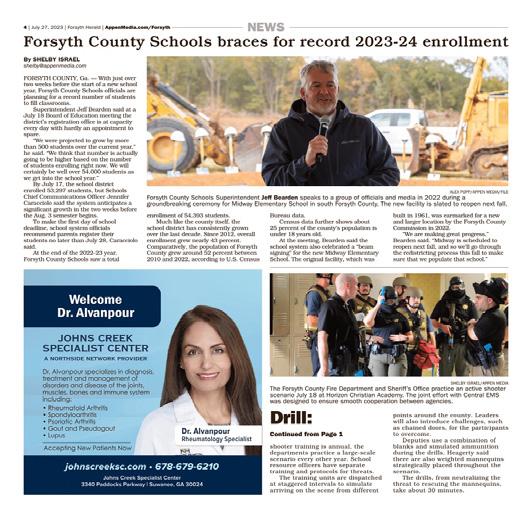




Page One - Third Place

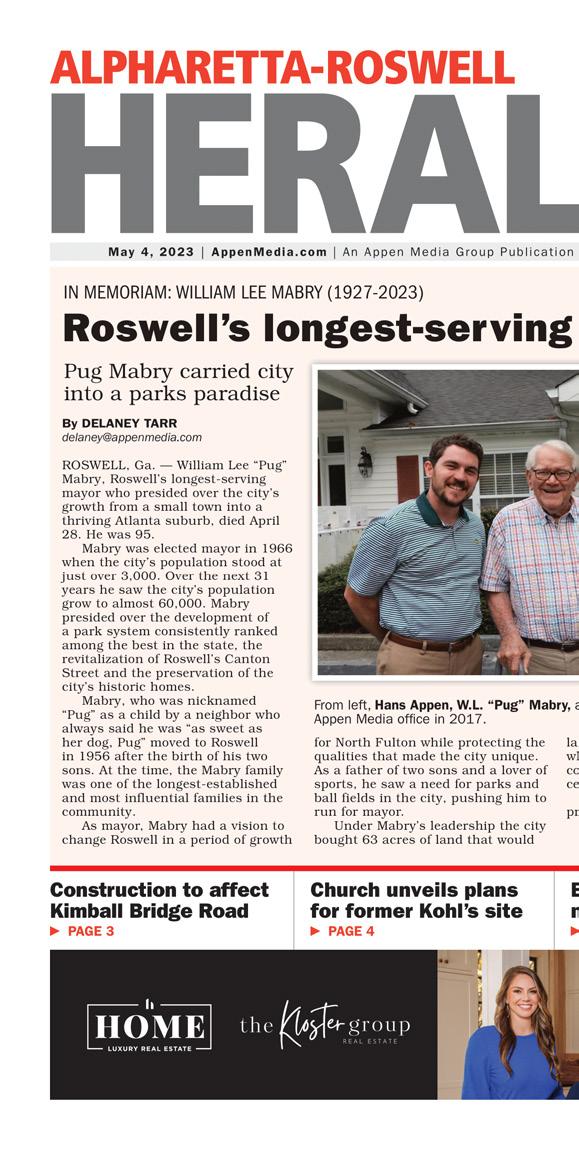















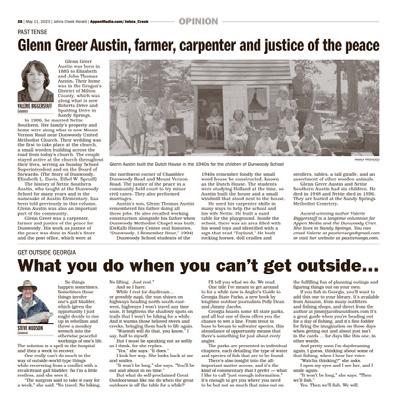




Lifestyle Coverage - Third Place, staff







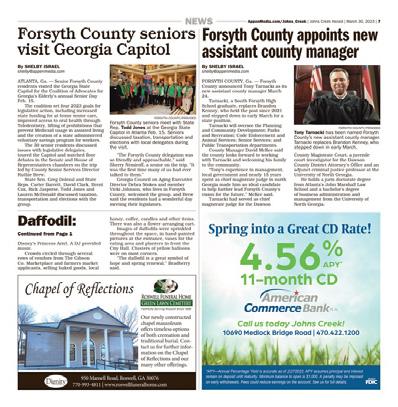




By AMBER PERRY amber@appenmedia.com
ALPHARETTA, Ga. — Juniors at Valor Christian Academy who have interest in a career in the medical field, developed and led learning stations for first grade students Feb. 14.
The learning stations featured handson activities focused on the ears and eyes.
The workshop was organized through Valor Christian Academy’s Diploma of Distinction program, which provides high school students an opportunity to receive credit for further study, research and experience in their area of interest. The school creates a space in students’ schedules for internships.
Because of the program, Head of School Jennifer Gastley said one student will be a licensed pilot by the time he graduates.
Gastley said Valor Christian Academy is one of the least expensive private schools in the area. Parents pay $10,500 for a full-time, 12th grade student at Valor Christian Academy. Meanwhile, Mount Pisgah Christian in Johns Creek

asks for $25,095 annually for upper school students.
Opened in 2020, Valor Christian Academy on Kimball Bridge Road
combines a hybrid school named Legacy Community Academy and a traditional school named Bridgeway Christian Academy.
“What we realized is that students learn differently, and not everybody needs to be sitting in a building five days a week learning,” Gastley said.
Students are given many options. They can be hybrid, receiving education at home and at school. They can go the traditional route, attending five days a week. High school students use Friday as an independent learning day, Gastley said, which helps them prepare for the college experience.
Parents can also do home school and pay Valor Christian Academy for a curriculum and standardized testing.
In the fall, the school is launching a fully virtual school program, but has one student piloting the program now.
More plans are in the works. Next year, Valor Christian Academy is rolling out a tiered special education support program. Special education is hard to come by in private schools, Gastley said, because there’s often not a mandate for private schools that they have to meet student needs.
“[Valor Christian Academy] is kind of like a one-stop shop for all modes of instruction,” Gastley said.
By AMBER PERRY amber@appenmedia.com
JOHNS CREEK, Ga. — About a dozen students from Chattahoochee High School are working to reduce harmful leakage from gas stoves, using a grant awarded to only eight schools in the country.
The students, members of the Chattahoochee InvenTeam, received $4,500 through the Lemelson-MIT program — a yearly research initiative out of the Massachusetts Institute of Technology geared toward high schoolers to invent technological solutions to real-world problems of their choosing.
The Chattahoochee InvenTeam is composed of mostly 11th graders. Lin Lee, their sponsor and the school’s media specialist, has each student play a specific role. Some work to get the word out as part of a communications team, some are figuring out how to finance any funding gaps, and some are more hands-on in building the project with technical skills or through sustainability research.
Sophie Lin, the administrative student lead, said the decision to study methane leakage came after a long brainstorming process. After Riley Jocham, a student on the technical team, found an article from Stanford that described methane emissions, even with gas stoves turned off, Lin said the group jumped on board.
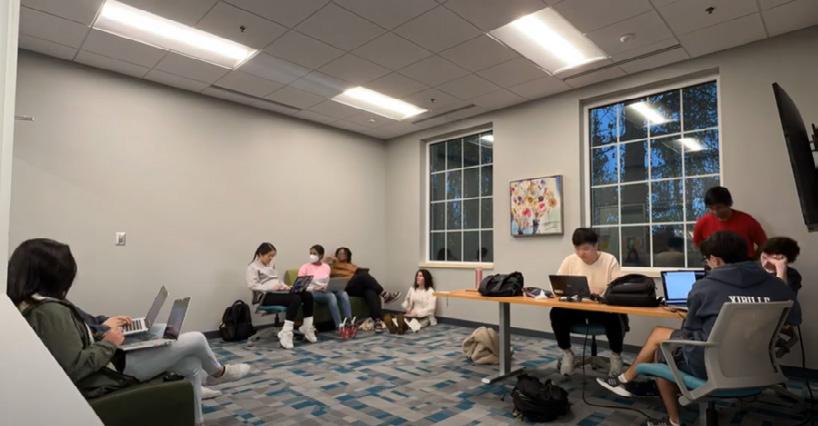
LEE/PROVIDED
KRISTEN
The Chattahoochee Inventeam, a group of Chattahoochee High School students, works to solve methane leakage from gas stoves through the Lemelson-MIT program. The grant helps fund high schoolers’ efforts to invent technological solutions to real-word problems.
Because the project is unaffiliated with Chattahoochee High School, Lin was responsible for recruitment. Students must find the time to work on the project outside of the school hours and other extracurriculars.
Keefer Lin, the technical lead, said he spends as many as three hours a day thinking about how to move the project forward.
In addition to methane, Lin said the group’s problem statement looks to
nitrogen dioxide as a harmful household gas. He said both are shown to increase the risk of cancer and cause damage to the environment. Srinidhi Chebrolu, the sustainability team lead, added that breathing in nitrogen dioxide can exacerbate pre-existing respiratory issues or increase the risk of developing those issues in the future.
“Most of the team, if not all of the team, owns a gas stove at home, and we use it every day,” Chebrolu said. “So,
we’ve been breathing these gases in for a really long time.”
Lin said the group has considered creating a mesh that traps the gas, but the “conundrum” they face is that the mechanism wouldn’t work in household conditions.
“Before we actually create a product, it’s all theory,” Lin said.
He noted several factors to consider in the inventing process, like the sustainability of the device and its accessibility and cost to homeowners. Eventually, the group will conduct patent research.
Lee, the group’s sponsor, said the target problem is still “uncharted territory” because it’s more of a recent problem, with gas stoves becoming the go-to installation post-2000.
For the past five years, Lee said students from Chattahoochee High School have been interested in applying what they learn through the Lemelson-MIT program. Last year, she said students tried to resolve sewer problems in Johns Creek.
But, Lee said this is the second time that students from Chattahoochee High School made it to the final round of applications.
“What’s missing from education these days … are they really given the chance to apply what they learn and … connect everything they learn, and really use it with a real-life connection?” Lee said.
In June, the group will fly out to MIT and present the project during Lemelson-MIT’s EurekaFest.
By AMBER PERRY amber@appenmedia.com
ROSWELL, Ga. — Zach Fields, vice president of the non-profit Construction Ready’s K12 program, prepped a class of about 20 students at Roswell High School recently to construct headers – boards placed above doorways and windows.
“You do not want them to fall on your grandma, first of all,” Fields, sporting a measuring tape on his front pocket, told the class. “We got to make sure that doesn’t happen. We got to build things the right way.”
When a teacher resigned at the beginning of the school year, the program’s 100 students were left to a rotating roster of substitute teachers assigning book work, rather than hands-on projects.
Fields stepped in during the second week of classes, leading sessions almost every day to fill the role. He’s with the nonprofit Construction Ready, whose mission is to provide statewide support to educational programs in the architecture and construction career sector.
Support could mean teacher training, connecting programs to industry partners and providing materials, and in rare cases, providing a teacher. Construction Ready serves 20,000 students across 200 workforce development programs.
Construction education support extends to the elementary school level. Fields said there are 600 students a year taking construction at Mountain Park Elementary School, and some of those kids go on to participate in the program at Roswell High.
“There’s just so much joy in building and creating something,” Fields said.
That day, Fields broke students into groups to begin their work constructing headers. Students measured and cut wood, using an industrial saw, in the school’s construction lab – a recent addition to the campus. In the past, students worked from trailers outside.
Jeric Rogers, 15, is in his second year in the construction education program.
“I just like working with my hands,” Rogers said. “It’s fun.”
His favorite project so far is a shed his class built last year. It took about a month to make.
Rogers’ classmate, 16-year-old Nicky Scedon, said the same. Scedon is not a


resident of Roswell, but he attends Roswell High to participate in the construction program.
Fields said industry problems benefit young people, like Rogers and Scedon.
Construction Ready was founded in 1993, when industry leaders around the state saw an imminent workforce shortage. The shortage hurts other sectors, like hospitals and schools, Fields said, and it increases the cost and timeline of development projects.
Skilled trade workers are aging out, Fields said, with around 40 percent retiring within 10 years.
“We’re doing everything we can to fix that issue, to tackle that issue,” Fields said.
